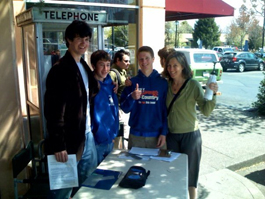home | north bay bohemian index | features | north bay | feature story

Photograph by Dane Jasper
Agree to Disagree: From left: Jeff Mich, Max Scheder, Peter Lafollette and Sandi Maurer.Wi-Fi Brouhaha
Sebastopol is divided over what it can't see
By Suzanne Daly
Most people, at least of those of a certain age, agree that the most precious commodity a human being has in this lifetime is health. So when Sebastopol resident Sandi Maurer found her health inexplicably declining, she did what anyone would do: she looked for a cure.
After consulting practitioners of both alternative and Western medicine, she still had no answers. Willing to try any method that might help her feel better, she had her house tested for electromagnetic radiation fields (also known as EMR or EMF). Electromagnetic radiation is emitted by cell phones, computers, wireless routers used by Wi-Fi networks, radios, TVs, microwaves, power lines, the sun and even by other humans. It is omnipresent but occurs at different levels; the higher the level, the greater the danger.
Maurer's test results showed elevated EMR levels, so she took steps to reduce it by fixing faulty wiring, disposing of her microwave, unplugging appliances and turning the power off at the breaker box whenever she wasn't using them. "I was getting healthier and healthier," Maurer says, seated in her home on a peaceful cul de sac. "I didn't take much stock in EMR levels. But as my health improved, I wanted to talk to people about this. It's out of the norm. Regular doctors don't know much about this. I wanted to be absolutely sure what I was talking about, so I decided to research this for one year before speaking out."
Maurer found multiple studies supporting the belief that EMR poses a health risk, including the 610-page Bioinitiative Report, the anti-Wi-Fi encyclopedia compiled by an international group of scientists and researchers that advises prudent avoidance of EMF.
Exactly one year later, Sebastopol's city council accepted an offer from Sonic.net for free Wi-Fi for a half-mile radius around downtown. After hearing opposition from residents, including Maurer and many alternative-health professionals, as well as supporting views from Sonic's CEO Dane Jasper and electrophysiologist and former university physics professor Robert Porter, the council rescinded its decision. Simply put, the council's actions reflected the belief that the possible risks of Wi-Fi outweighed the benefits.
After reading about the decision in the local news, Jeff Mich, an honor student at Sebastopol's Analy High School, was outraged. "I felt that people were narrow-minded, and that the city council didn't seek a fair balance between the two sides," Mich says vehemently. He decided to do his own research, and after looking at studies, including reports by the World Health Organization, he came to the widely held conclusion that Wi-Fi signals are no more harmful to people than using a cell phone. In fact, Mich found that Wi-Fi is already widely used by many Sebastopol businesses.
"By accepting Sonic's offer," Mich says, "business owners could save money and potentially cut down the amount of Wi-Fi signals citywide. It would be better for the environment and could draw tourists to the area."
Mich circulated petitions, collecting over 1,500 signatures. He and other student campaigners also met Dane Jasper, Robert Porter and Sandi Maurer in the process. "A lot of people cussed us out," says Peter Lafollette, a fellow student campaigner. "But Sandi was very polite, and is handling the situation in a logical manner." Mich's group presented the petitions to the city council, who agreed to reopen the issue in September.
Councilmembers once again must weigh the risks vs. the benefits. Many things used on a daily basis, such as X-rays, are known to be harmful and can cause cancer even when used diagnostically. But the benefit of their use is deemed to outweigh the risk; many lives are saved by what X-rays reveal.
The risks of EMR are unclear, but to folks like Maurer, they are very real. When health is at stake, life is as well. The benefits of Wi-Fi are also undecided. Sonic would serve a small segment of the population in a small town. It could enhance emergency response services during disasters like earthquakes and floods. And if all businesses conceded to use Sonic, potentially creating a small-server monopoly, the amount of EMR might decrease slightly.
What isn't likely to decrease is the heat surrounding the issue. "The bottom line is that the safety standards are inadequate to protect the public's health, and we need new ones," Maurer says. "It's a problem of miseducation," she continues. "My goal is that the city would become a vehicle for education."
Mich says education will be enhanced in the community and in schools by Wi-Fi use. But perhaps this is more than just an issue of Mich vs. Maurer or industry vs. illness, but that of a town divided by disbelief.
Send a letter to the editor about this story.
|
|
|
|
|
|